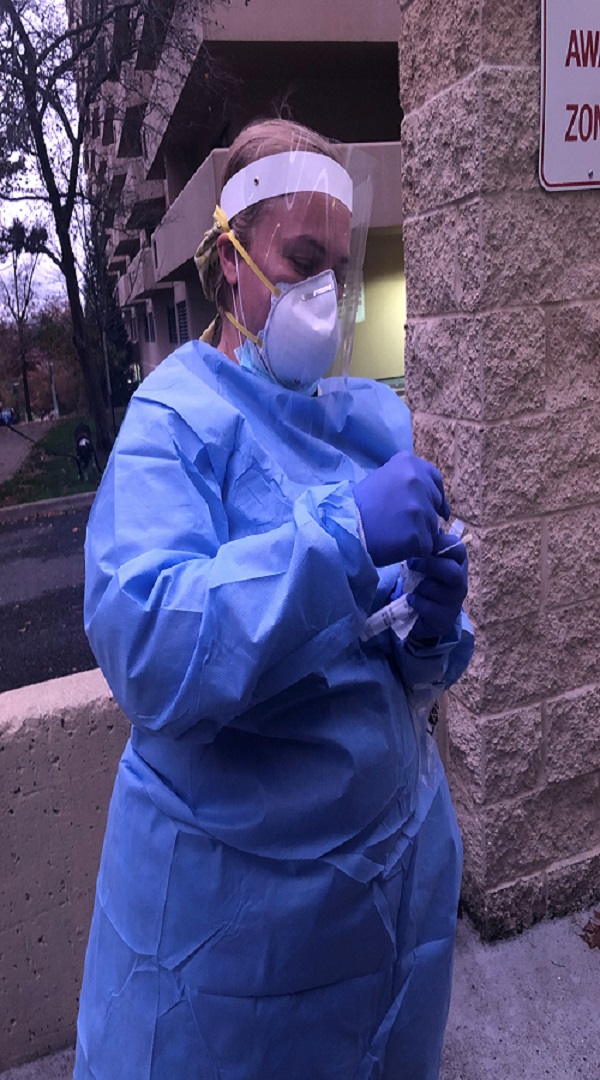The grouping of positive cases began on Dec. 25 and was declared an outbreak status by public health on Dec. 28. Since then 20 cases of coronavirus have been identified among homeless clients and seven among HSC staff. By early January a number of clients had finished their required quarantine.
Shaw looks at today’s bed list. “There were three new cases Wednesday night when we regularly test for COVID so the outbreak continues. Currently there are 2 in isolation on the 7th floor and 4 more in the respite beds. “Last week there were 13 cases in isolation all at once.”

Betsy Frantz, President and CEO of PathForward which operates the Homeless Services Center, says “Luckily we haven’t put any of them in the hospital. One hundred percent of our staff have been vaccinated, and at last count 85 percent of the homeless clients.” She says, “Nothing is mandatory. We give the clients the personal choice. It is better here than other places. It helps to have a nurse practitioner here to educate them on vaccinations.”
Shaw says in some ways the outbreak is easier to cope with this time round and in other ways it’s not. “We are not as afraid of it this time. We are sadly normalized by COVID.” But she says in a congregate setting like the center it is more difficult. “You and I can go home and isolate in place and have family around to support us but in a congregate facility it is our responsibility to keep everyone safe.” She adds, “Our job is to provide service. I just had COVID but I had to keep working from home. I couldn’t stop.”
Also she adds that people had gotten used to wearing masks the first time around but since the community is not wearing masks anymore, it is more difficult to convince the homeless clients that it is the right thing to do. The clients who stay in the shelter unless they have medical need are required to leave each morning at 8:30 so there can be a deep clean of the facility. They come back at noon, grab lunch in the cafeteria and go to their bed on the 3rd floor unless they have tested positive for COVID and are sent to the 7th floor.
Frantz says another issue is burn-out by front line workers. “We are losing them. They are exhausted. We have really felt it with the case workers who can’t work from home. They need to be face to face to see the body language and look clients in the eye. And a lot of the homeless clients aren’t tech savvy to be able to do a virtual meeting.”
Frantz adds it has taken not only a physical but an emotional toll on the staff. “I watched their shoulders drop when we geared up to do this all over again. Everyone is exhausted. There is no recovery.” She says her desire is to give bonuses and extra pay to front line workers. “They are coming to work.”
However, another related issue is the drying up of federal funds which could be used for bonus pay and were used to house Covid positive homeless clients in hotels to keep them isolated. These funds stopped some months ago.
With no Federal dollars for hotels, all clients must be accommodated in the HSC which has caused reshuffling of services and accommodations such as closing the dining room and classrooms and moving Covid patients to the 7th floor. “It’s not as easy as it sounds moving people from one place to another and keeping them safe. We changed the entire layout. The good news is we know what to do.”
Those who test positive for COVID are isolated on the 7th floor which they share with the hypothermia patients. The COVID isolation area is separated by men and women with each having a cot and a partition. “They are spread out with plenty of distance so they don’t spread germs to others who stay there,” Frantz says. The COVID area is also separated from the hypothermia area. They receive meals in a paper carton delivered to their cot.
Shaw’s day begins about 7:30 am when she checks in on the positive cases on floor 7 and on the patients in the five respite beds set up for those recovering from serious illnesses with nowhere else to go. Then there will be several clients asking to see her about things that have arisen during the night — maybe medication refills or assistance with a medical bill. If there is time she will move to administrative paperwork but dealing with things that arise in the moment.
There may be questions or concerns from the homeless clients who don’t have COVID and are housed on the third floor as part of the regular day program. There are 34 beds available to men and 12 available for women. There may be other concerns there that need checking or reports from a concerned community member about a suspected homeless person on the street who she needs to go see.
Shaw says the biggest challenge is getting into a new normal routine. A lot of the programs offered at the HSC such as education classes and job training have been put on the back burner. The ultimate goal is to get the clients into permanent housing. “It starts looking like COVID is under control and then — boom! Every time we think we can bring services back, every time we think we are good to go, we go two steps back.”
But Frantz says, “We are very fortunate to live in an area that has compassion. Arlingtonians try to help when they can.”
